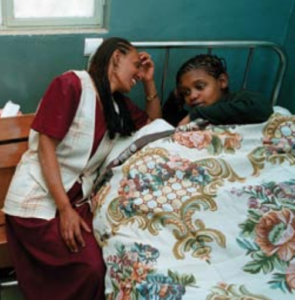Access to Hinari is critical at CURE Ethiopia Children’s Hospital
Published: jueves 29th septiembre 2011
Without Research4Life’s HINARI programme, a young cancer sufferer at CURE Ethiopia Children’s Hospital would have lost one of her legs.

By providing up-to-date literature, Research4Life’s HINARI program is helping patients at CURE Ethiopia Children’s Hospital.
In July 2010, a 22-year-old university student arrived at the CURE Ethiopia Children’s Hospital with a painful, swollen leg. She was there for a second opinion after receiving grim news at another hospital. Her previous doctors had diagnosed a rare form of cancer in her tibia, or shinbone. Treatment, they had told her, was available in other countries, but not in Ethiopia. The alternative – and her only choice, given she did not have the money to travel – was to amputate the leg.
Eric Gokcen, an orthopaedic surgeon at the CURE Hospital, confirmed the diagnosis. However, in 12 years working in the United States, Dr Gokcen had never come across this type of cancer. Despite having access to some excellent books in the hospital library, he had found very little information on treatment. Luckily, a previous job at a sister hospital in Kenya – with limited internet and out-of-date textbooks – had made him aware of HINARI, which has been available at the Addis Ababa CURE hospital since it opened in 2009.
The medical literature accessed via HINARI revealed a way to treat the cancer without amputating the affected leg. This involved removing the cancerous section of the bone and grafting in a donor bone in its place. Fortunately, a United States company provided the donor bone, and Dr Gokcen and his team successfully performed the graft. As of October 2011, the patient had healed from the surgery, was pain-free and had returned to university.
«I frequently access HINARI to find articles and information that helps me care for our patients»
Dr Gokcen notes that having access to the most current literature allows medical staff to offer patients the best possible care. Further, as a relatively new facility, the hospital’s research programme is benefiting enormously from the ability to perform complete literature searches. And as a training site for orthopaedic residents, HINARI is an invaluable teaching aid for both the hospital and, ultimately, the medical professionals across the country.
“For the physicians here, the extensive access to current literature available on HINARI is a vital step in bringing medical care in Ethiopia up to recognized world standards,” says Dr Gokcen. “We now know that any future research we do will be able to add significant knowledge to the medical community.”
This story is part of “Making a difference: Stories from the field” an illuminating series of case studies providing insights into how access to peer-reviewed research from Research4Life is benefiting the health, well-being, and economic and social development of communities in the developing world.





